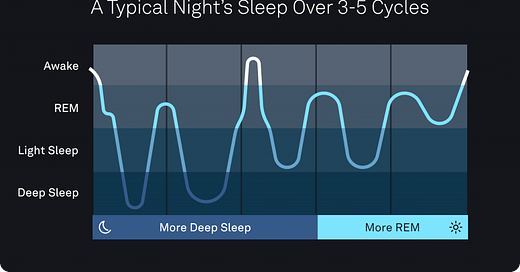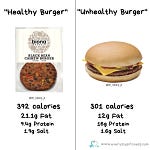This email is brought to you by
Neuro Athletes,
There is a difference in sleep stages and there is equally a difference in the quality of each stage. It’s incredibly important that we are able to differentiate between the different stages so we know what we are optimising and why.
Most of you wear some kind of wearable. However, many of you only look at the data without really understanding how to optimize the data.
Let’s take this screen shot from the Oura ring app as an example;
It gives a clear breakdown of each sleep stage and how much of it we are getting but what does that mean for you?
Understanding REM Sleep
REM sleep optimizes emotional and mental health. We were a chronically-stressed population before the pandemic and will likely continue to be one after, but if you start to focus your attention on routines that increase REM sleep, you can find a sleep practice that works for you.
Why is it called REM sleep? Well, neurophysiologists and sleep scientists use a polysomnography (PSG) to record sleep. A PSG records your brain waves, the oxygen level in your blood, heart rate, breathing as well as eye and leg movements during a sleep study.
When a patient is going through a sleep study, several things occur during sleep that enable scientists to pinpoint the different stages of sleep.
Under strict sleep staging criteria on polysomnography, REM sleep is defined when a patient exhibits:
(1) Rapid Eye Movements - on the EEG you can pick up on someone’s eye movement and what scientists found was that the eyes move in horizontal fashion and that they move rapidly hence, the name REM.
Second to that, another two things occur during this time and they are:
(2) Muscle Atonia, which simply means loss of muscle strength.
(3) EEG Desynchronization (compared to slow wave sleep).
So that’s the history but now let’s look at what REM sleep is for the average person.
Usually, REM sleep happens 90 minutes after you fall asleep. The first period of REM typically lasts 10 minutes. Each of your later REM stages gets longer, and the final one may last up to an hour. Your heart rate and breathing quickens and we principally have the most vivid, the most hallucinogenic types of dreams.
Difference Between REM and Deep Sleep?
Here’s a general rule of thumb: deep sleep is about the body, REM is about the brain. The brain is very active during REM sleep, yet the body is very inactive. Actually it’s so inactive, you’re actively paralyzed during REM sleep.
REM is when most dreaming happens and your eyes move rapidly in different directions (hence the name). Heart rate increases and your breathing becomes more irregular.
REM is very important for emotion regulation and memory, whereas in deep sleep you secrete hormones such as growth hormone and testosterone. It’s also the peak of protein synthesis at the cellular level, which keeps many processes in the body working properly.
REM Blockers
In the interest of science, I thought it would be effective to provide insight into what blocks this part of sleep rather than ‘factors impacting sleep’.
Here is my list;
Alcohol is a sedative drug and what you're doing there is simply knocking yourself out. You are removing consciousness quickly from the brain by way of having alcohol but you're not putting yourself into naturalistic sleep. The other issue is that alcohol will fragment your sleep — it will litter it and punctuate it with many more awakenings throughout the night, so short ... that you tend not to remember them. So, once again, you're not quite aware of how bad your sleep was when you had alcohol in the system. The final aspect of alcohol is that it is very good at blocking your REM sleep, or your dream sleep, which is critical for aspects of mental health within the brain and emotional restitution too. So alcohol [is a] very misunderstood drug when it comes to sleep — not helpful.
Medications such as antidepressants can cause less REM sleep. Reductions in the amount of REM sleep and increases in REM sleep onset latency are seen after taking antidepressants, both in healthy volunteers and in depressed patients. Antidepressants that increase serotonin function by blocking reuptake or by inhibiting metabolism have the greatest effect on REM sleep. The decrease in amount of REM sleep appears to be greatest early in treatment, and gradually diminishes during long-term treatment, except after monoamine oxidase inhibitors when REM sleep is often absent for many months.
Temperature - one of my favourite topics when it comes to sleep. It turns out that just before we fall asleep, our bodies begin to lose some heat to the environment, which some researchers believe actually helps to induce sleep. During sleep, our central set temperature is reduced by 1 to 2°F. As a result, we use less energy maintaining our body temperature. Methods such as taking a hot bath prior to sleep have been hypothesised to increase sleep quality. In fact, warming for up to 4 h, between 1 and 8 h before to going to bed, increases slow wave sleep (SWS) but decreases REM sleep. So what does that mean? Well it means that if you are too hot in bed then you will kick yourself out of REM sleep so maintaining cooler temperatures when you are sleeping is always better.
In order to get your best sleep yet, you’ll need a sleep tracking product, like the Eight Sleep Pod that analyzes your nightly sleep data and tells you exactly how much sleep you’re getting in each stage. Sleep trackers allow you to pinpoint your sleeping patterns and compare this information to how much time in each sleep stage your body actually needs for a good night’s sleep. By following the simple steps sleep trackers suggest such as avoiding caffeine before bed, you can help regulate your sleep and improve your overall sleep health.
I recently chatted with Alan Couzens on the state of elite athleticism. Alan is a physiologist and developer within the health performance space. He focuses a lot of his work and research on endurance athletes.
Here is what he had to say:
Q1: In your opinion, what is the biggest predictor of underperformance for an athlete
If we're defining 'underperformance' as an athlete not performing at a level that is consistent with the work they are putting in, I'd say that one of the best predictors of this occurring would be increased life stress during the preparation. I consistently see poor response to training during those periods when an athlete has a lot of "other stuff" going on in their greater lives.
On the flipside, when an athlete is happy and has stable, relatively low stress living circumstances, I am often amazed by how well they respond to the training. I 100% believe that this makes up a large part of the success of National Training Centers - where the athlete's regular life stresses of cooking & laundry & working a job :) are removed & the athlete can focus completely on training & recovery.
While that level of simplicity may be prohibitive for most of us, simplifying life as much as possible during important periods of preparation is a powerful strategy to high performance.
Q2: In terms of professional sporting teams. Is there a policy change you would take to enable better performance amongst athletes and why?
I think the biggest thing lacking from most professional sports, both in terms of athlete performance and well-being is simply space between competitions.
Space to both recover from the stress of competition and to lay that fitness base that helps them improve & deal with the competition-specific load. There are obviously financial factors at play that push towards more and more competitions in the schedules of professional sports that make it challenging to find that space once an athlete is at “that” level, which is why I think it's really important that we don't rush young athletes to "go pro" before they are fully developed as athletes.
This emphasis on not rushing athletes & allowing the time and space for proper long term development would be the policy change that I would like to see more of in professional sports.
Tweets of the Week







A Vegan, Cruelty-Free and THC-Free Cream!
Ever wanted to interact with your nervous system the right way?
Need pain relief? Check this out. Basic Jane products are simple, effective, and high-quality topicals for health and well-being. They are pure, safe and provide consistent results every time.
The best part?
Basic Jane products are vegan, cruelty-free, and THC-free!!! They offer a variety of topical formulas, including creams, gels and oils.
Neuro Athletics subscribers get 15% OFF all products!!! Be awake, find relief and relax with Basic Jane.
Click the link below or use discount code PAINBEGONE to redeem this special offer.

















Share this post